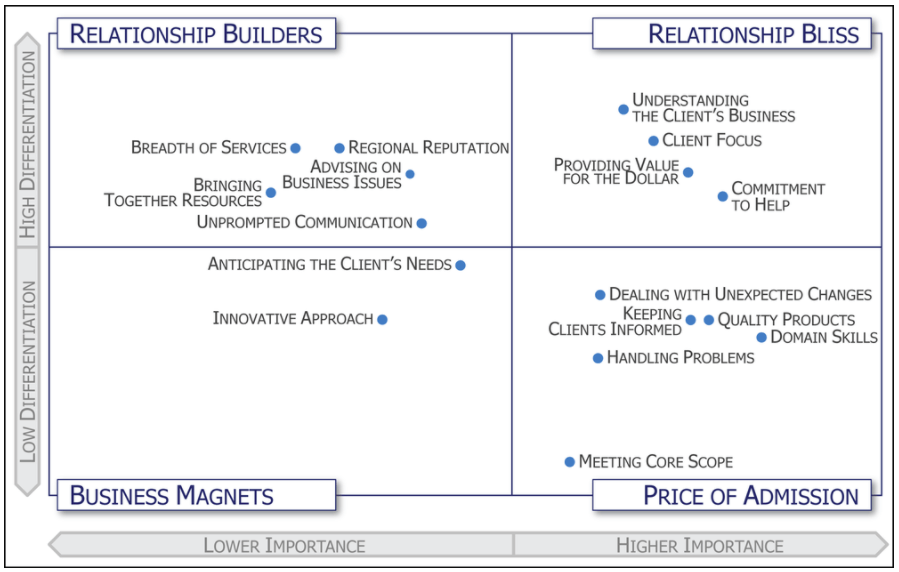If law firm business development is difficult for you, you’re not alone.
There’s more to building a business than buying a few online ads and praying for clients. You’ll need to spend time building relationships, while also keeping existing clients happy to ensure repeat business—all of which can be more difficult than it sounds.
We’ve rounded up a few best practices surrounding client relationships, based on our webinar, Business Development Strategies for Law Firms, held by Clio’s own Lawyer in Residence, Joshua Lenon. As he puts it:
Quite frankly, a lot of your own career development centers around your ability to bring in business, so it’s something that you should be focussing on from day one.
Whether you’re starting a new practice, or just looking to brush up on your law firm business development skills, this list includes several valuable tools to build positive client relationships and ensure sustainable growth for your law firm.
Client relationships and law firm business development
For any law firm—or any business, for that matter—it’s important to focus on building strong client relationships. Happy clients will keep coming back, and they may also recommend your services to others.
There are plenty of ways to build relationships, but some approaches work better than others. If you want to build the best client relationships possible, take a look at this chart from BTI Consulting, which outlines 17 activities to consider.

Source: BTI Consulting
The two activities in the Business Magnets quadrant are less important. As Joshua says:
For the most part, your clients aren’t searching for an innovative approach. They’re not searching for a law firm that anticipates their needs, because they know that information already. They know what their needs are. So if you’re marketing yourself solely on these two features, while you might stand out a little bit, you might not be able to close the business. To close the business, you have to at least meet the price of admission.
In other words, the six activities listed in the Price of Admission quadrant outline the basic expectations most clients will have for you. Clients won’t single you out as exceptional for keeping them informed and dealing with unexpected changes, but you’ll need to demonstrate that you’re capable of these activities to close new business.
So how do you build client relationships to reach relationship bliss? According to Joshua and BTI, there are at least five things that you as a lawyer can do to keep your clients coming back:
1. Reach out with unprompted communication
Joshua states:
Unprompted communication is something that I think is really easy for lawyers to do, but so few actually do it. Reaching out to a client with an update—whether it’s significant or not—is a great way to show involvement in a matter, but a lot of lawyers don’t necessarily do this.
You may like these posts
2. Pay attention to regional reputation management
For lawyers responsible for business development in solo, small, and medium sized firms, Joshua notes:
You’re going to be dealing with regional clients, and they’re going to be asking their colleagues whom they turn to. If you have a regional reputation—and that can be demonstrated in a variety of different ways, whether it’s by participation in community activities, or by coverage in the local news—your ability to demonstrate that reputation will help you build a stronger relationship.
3. Offer a breadth of service
Lawyers can’t claim to specialize under most states’ ethical advertising rules, but many still fall into the trap of keeping a narrow focus and missing out on clients.
As Joshua explains:
We tend to focus on a particular area of expertise and seek clients for that. But clients are actually seeking lawyers that can handle their needs, not necessarily just your expertise.
Make sure that you’re open to helping clients, even if it means referring or handing a client off to an appropriate source for aid.
4. Demonstrate your value
As a lawyer, you need to be able to demonstrate your value. But while some lawyers charge upwards of $1,000 per hour, demonstrating dollar value can sometimes be difficult. And, clients can sometimes see lawyers as interchangeable, regardless of their skill or expertise.
That’s a problem—in that scenario, clients see cost but not value.
“You need to show the client you’re actually saving them money or time or emotional grief because they’re hiring you,” Joshua states.
5. Show a commitment to help
“You need to be able to understand the client’s business,” Joshua says. “It may be family affairs, it may actually be a business, but you need to be able to recognize what they’re actually seeking, focus on it, and demonstrate a commitment to help.”
How do you demonstrate this? Dan Pinnington does it with a simple question for clients: “What’s your greatest concern?” He finds that this forces his clients into a moment of clarity, and allows him to reassure them that he can help with their greatest worries as they apply to the matter at hand.
“Dan didn’t arrive at this question because he was told about it,” Joshua says. “He arrived at this question because that’s what worked with the clients he was seeking.”
Key takeaways
To sum up, here’s what you need to focus on to build strong client relationships for sustainable law firm business development:
- Reach out. Unprompted communication does wonders for showing your clients that you’re involved.
- Manage your local reputation. Get involved in your community to build relationships with potential clients.
- Broaden your horizons. Be ready to help anyone who comes through your door—even if it means referring them to another lawyer.
- Communicate value. Take extra care to explain how your services save your client money and/or time.
- Focus on helping. Ask your client what their greatest concern is, and show your commitment to helping with that.
There’s a lot more to successful law firm business development beyond building client relationships. Traditional networking activities and online promotion should also be part of your plan. You’ll also need to track your efforts to ensure they’re effective.
Want to learn more about marketing, business development and growing your law firm? Read our guide to online marketing.
We published this blog post in December 2016. Last updated: .









